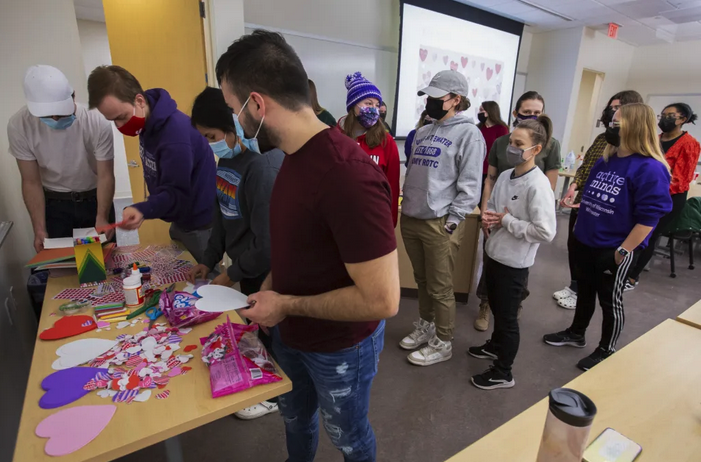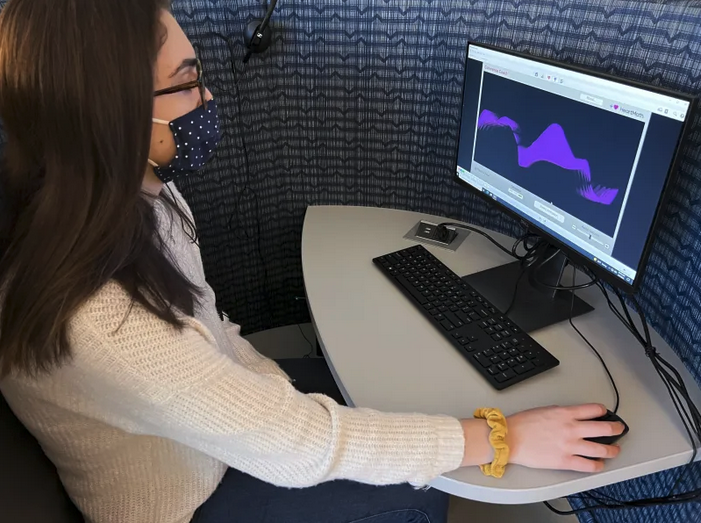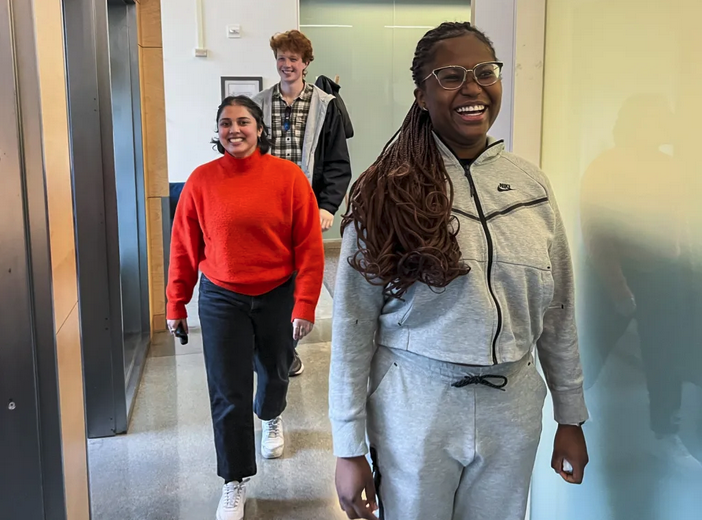College students to administrators: Let’s talk about mental health
Covid distress made issues more urgent, but students fed up with inadequate mental health care began fighting for change even before the pandemic
By Laura Pappano, Reprinted from The Hechinger Report
MEQUON, Wis. — With the pandemic dragging on, the string of setbacks that recently hit Lucas Regnier, a sophomore at Concordia University Wisconsin, has become oddly routine.
A wrestler and physical education major, he suffered a concussion and a sprained ACL. Then, he and half his team got Covid, forcing him to isolate in the basement of his girlfriend’s parents’ home nearby, disrupting his academics and prized time training with teammates.
“I have been out eight weeks,” Regnier, who has anxiety and ADHD, said, sporting sweats as he finally attended practice in early February. “I have been struggling to keep mentally strong.”
His struggle — and openness — are common now, both on this 3,300-student Lutheran campus and at colleges across the country.
“The pandemic has spurred conversation and openness around mental health in ways we have not seen before.”
Becky Fein, director of training and engagement for Active Minds
It is hard to overstate how much the pandemic has short-circuited the college experience and affected students’ well-being. To those already burdened by the demands of social media and fears about how to succeed in the world, Covid piled on.
Students have weathered shifting academic schedules and mask protocols. They have faced restrictions on the free-form socializing that builds acquaintanceships and a sense of belonging. As one Concordia student put it, “I haven’t had a normal year of college that wasn’t impacted by Covid.”
Data from the 2021 Healthy Minds Study shows 34 percent of college respondents struggling with anxiety disorder and 41 percent with depression — rates that have risen in recent years. More broadly, nearly 73 percent in the Fall 2021 American College Health Association National College Health Assessment survey reported moderate or serious psychological distress.

De’Shawn Ford, a junior majoring in psychology at Concordia University Wisconson and president of the Black Student Union, speaks with Nora Rudzinski, a senior majoring in mass communications, outside the school’s entrance in Mequon, Wis. Credit: Laura Pappano for The Hechinger Report
For years, college students have agitated for improved mental health services, such as more counselors, easier access to them and greater awareness and sensitivity, including having professors put suicide prevention and other hotline numbers on syllabuses. They have been met with a tepid response from administrators who have traditionally considered mental health a private matter, not an institutional one.
That is changing. Covid is cracking open a conversation that students are desperate to have.
It’s true that there are not enough professionals to meet rising demand. (Counselor burnout is real.) Yet this is about more than counselor numbers; students are pressing for an array of tools and, critically, a culture shift. What they want most is more talk about — and more attention paid to — a subject once treated as taboo.
“We should always be talking about mental health. It is one of the best things you can do to prevent suicide,” said Kelsey Pacetti, a senior majoring in social work at the University of Wisconsin-Whitewater, a campus of 11,000 students set in a small city between Madison and Milwaukee. “When I started to be open with other people is when things started to turn around for me.”
Pacetti, who described herself as “a multiple suicide-attempt survivor,” is president of the campus chapter of Active Minds, which helps students advocate for change around mental health, from more flexible academic practices to integration of messaging across campus.
Nationally, the number of Active Minds chapters has more than doubled over the past six years to more than 600, including 130 high schools, said Becky Fein, director of training and engagement. “The pandemic,” she said, “has spurred conversation and openness around mental health in ways we have not seen before.”
As a student at Dartmouth in 2020, Sanat Mohapatra launched a mental health peer support app called Unmasked, which kept students connected when the pandemic sent them home. It now has 12,000 users at 46 schools. Students post anonymously to a campus-specific group or a broader audience. They share experiences, from what medications they take (and the side effects) to interactions with specific counselors and painful battles with social anxiety.

Members of the Active Minds chapter at the University of Wisconsin-Whitewater gather supplies to make valentines to themselves at a recent meeting. Credit: Image provided by Craig Schreiner
Recently, Mohapatra said, more of the 75 daily posts are from students seeking to organize. Students want to discuss “what mental health should look like on campus — what is the administration’s role, what is the student’s role?” he said. “Just this week, I saw several petitions like, ‘We have to change the administration’s policies.’ ”
Pacetti’s chapter of Active Minds, which has grown from fewer than a dozen to 35 members over the course of the pandemic, has provided valuable support. “It is a place where I don’t feel stigma exists and I can be myself and share how I am feeling,” she said. At a recent meeting, she brought supplies for students to make valentines to themselves.
Yet Pacetti also wants institutional change. She believes mental health education should be required. Why are there “so many random requirements, but why is mental health not one of those?” she said. “Everybody deserves the skills to get through college, through life.”
That view — that mental health talk is a tool that prevents trouble rather than creating it — is starting to reach administrators, said Diana Cusumano, director of The Jed Foundation’s campus and wellness initiatives, which guide colleges in building mental health and suicide prevention supports.
“One of the big changes we have seen is a huge interest in making sure students on campus have what they need for their mental health,” she said. “And the interest is coming from presidents and provosts.”
At Concordia, as for many of the 400 schools that have worked with JED, outreach followed tragedy. Two students died by suicide, in fall 2017 and summer 2018, said Beth DeJongh, an associate professor of pharmacy practice who knew both and had one in class at the time. She co-directs the JED campus team, which gathers students along with faculty and staff from academic departments, financial aid offices, athletics, ministry, counseling, housekeeping and campus safety, among others. With JED’s guidance, the group examines how the university operates, from leave of absence policies (it lacked a formal one) and support services to how it communicates with students.
“I needed something to pour my grief into,” said DeJongh. “I wanted to focus on prevention.” And students clearly wanted help; use of campus counseling rose 23 percent from 2019 to 2020.

Grace Baker, a senior majoring in psychology at Concordia University Wisconsin, learns to use a tool to calm her breathing in one of many spaces on campus for students to relieve stress. Credit: Laura Pappano for The Hechinger Report
Yet it could take weeks to see someone. It was hard even to make an appointment, said Tracy Tuffey, who retired in December as chair of the university’s psychology department but continues working as a life coach with the campus’ wellness team.
“We had no intake,” she said. There was also no receptionist. Because counselors were in session, they did not respond to messages from students until the end of the day. In addition, all the counselors were white, which is also an issue elsewhere. “Our students of color were not seeking out the counseling center,” said Tuffey.
The shortage, especially of therapists of color and those focusing on LGBTQ+ students, is a problem across the country. This has fueled the growth of digital mental health clinics like Mantra Health, a company founded in 2018 that partners with 52 campuses to serve 500,000 students, said Dr. Nora Feldpausch, medical director of Wellround, Mantra’s provider group. Mantra connects students to a provider, either nearby or virtually, then coordinates care with the campus and offers students support via video chat and messaging.
“The conversation nationally has shifted from ‘Do we do hybrid care?’ to ‘How do we do hybrid care?’ ” she said. It has unfolded as campus counseling centers “are now being hit by a tidal wave of students with pretty significant mental health concerns.”
Still, not all students need “full-blown therapy,” as Tuffey put it. Concordia embarked on a pilot in October to offer students support that is not therapy, hiring five life coaches; three are Black. All were trained by Daniel Upchurch, an assistant professor of psychology at the University of Louisiana Monroe, whose app, Positivity+, facilitates online coaching and counseling with a focus on providers from diverse backgrounds. Students at Concordia do not pay for the sessions.
De’Shawn Ford, a junior majoring in psychology who is president of the Black Student Union, said having these coaches “has broken down a barrier for mental health as it relates to our Black students.” Several, including himself, are now meeting with life coaches, he said.
“We should always be talking about mental health. It is one of the best things you can do to prevent suicide.”
Kelsey Pacetti, a student at the University of Wisconsin-Whitewater
The school also hired two intake and triage coordinators who screen students to assess what help they need. From October to mid-January, coordinators met with 183 students; they connected 155 to counselors, 22 to life coaches, 15 to peer support and others to academic advisers, campus ministry, sports teams or campus activities; 160 were connected to more than one.
The approach provides students with more timely help. Whether they call, email or walk in, they get a response within 24 hours; urgent requests are answered even faster, said Rebecca Hasbani, one of the coordinators. The center has some evening hours, which have proved critical, she said. Recently, Hasbani said, a student expressing suicidal ideation had walked in at 5 p.m. “If we had not been there, he might not have reached out,” she said.
Concordia’s efforts also include a quiet, dimmed room called “Evelyn’s Place,” named for a beloved former employee, with massage chairs, weighted blankets and a Stress Management and Resiliency Training (SMART) lab tool that teaches breathing techniques. Mini versions of the rooms, “Evelyn’s Corners,” are tucked into dorms and the school of pharmacy.

Concordia University Wisconsin has created quiet retreat spaces on campus, including this new spot in the school of pharmacy. Credit: Laura Pappano for The Hechinger Report
Nora Rudzinski, a senior majoring in mass communications, sees the spaces as a sanctuary for students “who may not have crippling depression but feel overwhelmed.” She stops in to “get out of my head space,” she said. “It is literally walking in that room and sitting on the floor.”
Students can do a lot to help themselves, said Jennifer Laxague, assistant director of LiveWell, the campus health and wellness office, at the University of Washington in Seattle. She supervises and trains students as peer coaches and health educators; last February, her office piloted one-on-one peer wellness coaching sessions, at first virtually, then, starting in September, in person.
Students make appointments online with one of three coaches and state a goal for the session. Nikita Nerkar, a peer wellness coach and senior from Phoenix majoring in psychology, said students often “are looking to have a space to talk things through.”
Many feel stress from deadlines and schoolwork, made worse by poor sleep habits and time management. Kaycie Opiyo, a peer wellness coach and senior from Vancouver, British Columbia, who is majoring in biochemistry and public health-global health, said she reminds those feeling defeated of their strengths and that it is “a common experience and they are not alone.”
There is a counseling center on campus, but Laxague said that universities “cannot provide long-term therapy for 20,000, 30,000, 40,000 students.” Nor should they: “A lot of what people are calling ‘mental health struggles’ are actually figuring out this human experience and figuring out how to be an adult,” she said.
Questions like, “How do I build community? How do I build meaningful relationships?” are important, she said. Students now “are more aware and willing to ask for help” with such things. But, said Laxague, “you don’t necessarily need a therapist to learn those skills.”
If you or someone you know is having thoughts of suicide, the National Suicide Prevention Lifeline at 1-800-273-TALK (8255) and the Crisis Text Line — text HOME to 741741 — are free, 24-hour services that can provide support, information and resources.
This story about mental health on campus was produced by The Hechinger Report, a nonprofit, independent news organization focused on inequality and innovation in education. Sign up for the Hechinger newsletter.
To access the resource, please click here.
To learn more about the conference, please click here.












